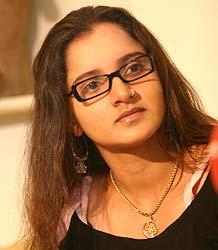After making it to the cover of Time magazine, Sania Mirza finds herself listed as one of the ten people capable of changing the world by London's intellectual weekly New Statesman published on Monday.
In a 742-word article by Jason Cowley, the weekly says it is difficult to believe that "a slender 18-year-old Muslim tennis player from India has the potential to change the world, but it is equally difficult to overestimate the effect Mumbai-born Sania Mirza, currently No.37 in the WTA singles rankings, is having on millions of young men and women, and especially women."
 "She is the first female Indian tennis player to be ranked in the world's top 40, indeed, she is the first significant female athlete of any kind, in a country where women have been typically discouraged from taking up sport," the article says.
"She is the first female Indian tennis player to be ranked in the world's top 40, indeed, she is the first significant female athlete of any kind, in a country where women have been typically discouraged from taking up sport," the article says.
It notes that Sania has the discipline, tenacity, flamboyance and, above all, the talent to go much higher in the rankings and, in so doing, inspire a whole new generation of Indian girls to express their hopes and ambitions through sport.
Sania, who is actually Hyderabad-born, is bracketed with the likes of The Emir of Qatar, who is showing the Middle East a different route to modernity, Barack Obama (America's fastest-rising political star), current US senator for Illinois Anton Zeilinger and physicist and co-director, institute of Quantum Optics and Quantum Information, Vienna, Samira Makhmalbaf.
Recalling her recent tiff with Muslim clerics over her dress code, the article says, "at home, in India, Mirza is a role model and an icon, her fame locating her somewhere between Bollywood and the mass adulation that surrounds the Indian cricket team. She is celebrated as much for her attitude and fashion sense (she wears a nose-ring and librarian glasses) as she is for her talent.
"She evidently enjoys the attention and delights in confounding expectations of exactly how a young Muslim woman from the subcontinent should behave. At Wimbledon, she wore a T-shirt bearing the slogan: 'Well-behaved women rarely make history'; at the US Open in September, where she lost in the quarter-final to the Russian sensation Maria Sharapova, her T-shirt read: 'You can either agree with me, or be wrong'.
"All this means that Mirza is in ceaseless demand for interviews, billboard advertising, endorsements (her fee is reported to be second only to the great batsman Sachin Tendulkar's) and television appearances.
Recalling the threats from a Muslim cleric, Cowley writes: "The cleric is correct in identifying the world-transforming potential of a young, attractive, articulate and media-smart teenage Muslim tennis star, but wrong in his assessment of that influence.
"He understands how sport has become a common language for the global tribe, as well as an engine of change, an aggressive symbol of meritocracy and the mirror in which we see reflected back at us the competitive, style-driven, money-and celebrity-fixated world in which we live."
Posing the question can Sania have a similarly transformative effect like Muhammad Ali and Pele, not only in India but also throughout the world, the writer says, "she may not have won a major tournament, yet already she occupies a role through which flow many of the most significant intellectual and cultural currents of our times: the clash between secularism and political Islam, the emancipation of women in the Muslim world, the dominance of celebrity, the tyranny of the image, the emergency of India as a world power."
Referring to her recent complaint that: "every word I speak, every skirt I wear, is discussed and analysed," on return to India from the United States, Cowley concludes: "If she continues to improve as rapidly as she has over the past six months, Sania Mirza will simply have to get used to such obsessive scrutiny. There is no turning back now."
Photograph: Jewella Miranda






